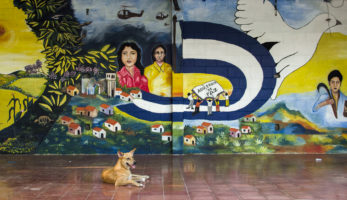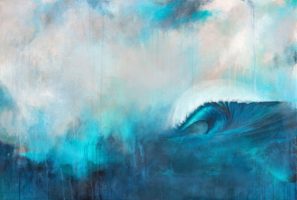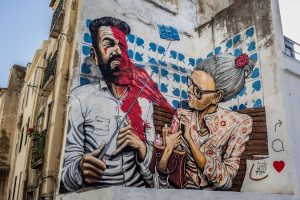Support Hidden Compass
We stand for journalism, science, history, and hope. Make a contribution to Hidden Compass and stand with us.
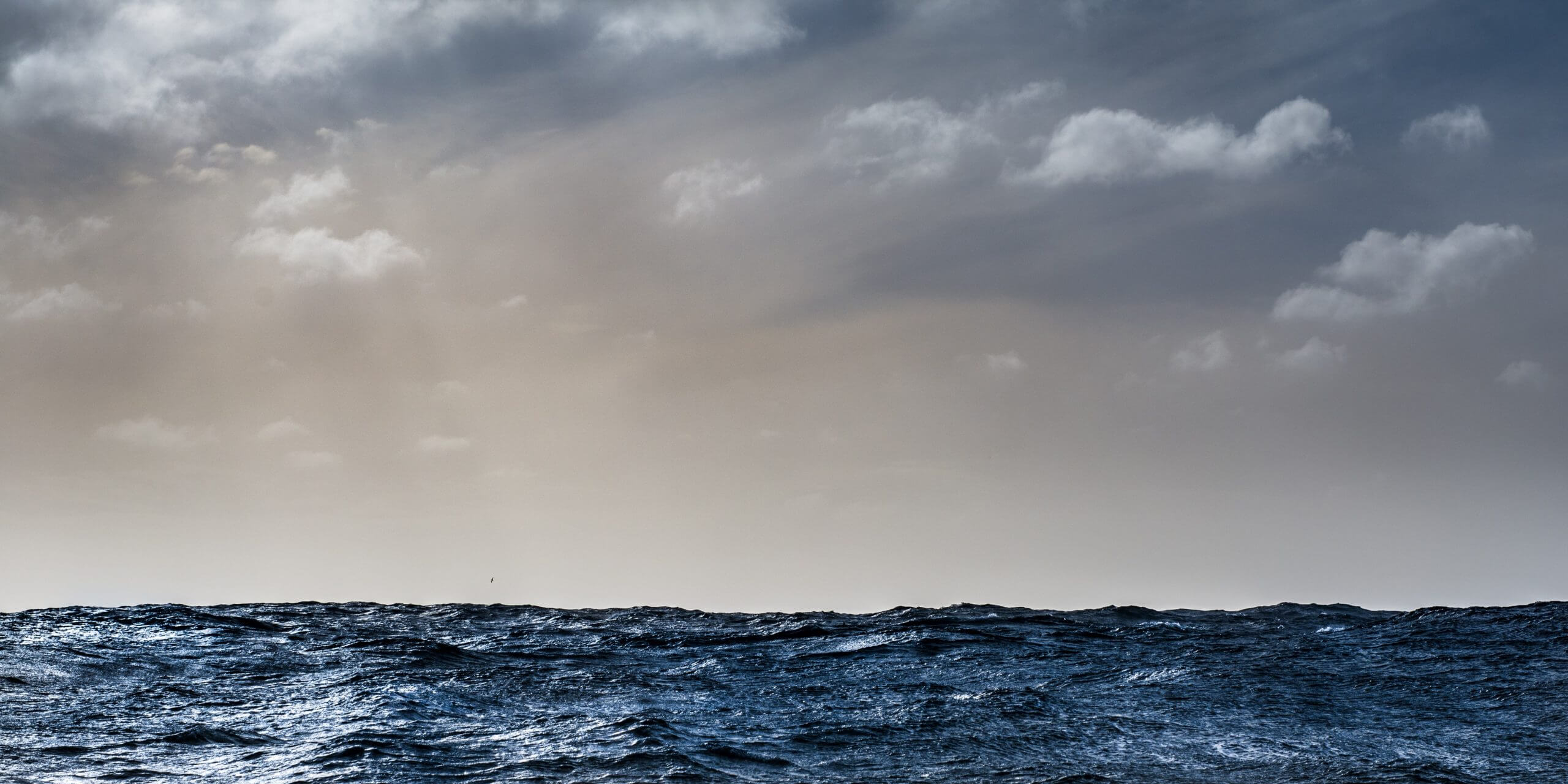
A calm moment in the vast Drake Passage. PHOTO: SIVANI BABU.
Athousand tiny needles of saltwater stung the side of my face. Viscous ocean air swirled and filled my lungs, the taste of salt settling on my lips as I wedged myself between the walls of the boat’s cockpit and snapped another photo of blues. Prussian, cobalt, sapphire, navy — a hundred other shades I couldn’t name. No horizon, no foreground, no scale. No subject. It was a photograph of nothing. And yet it felt familiar.
I looked at it again. No. Not nothing. It was a photograph of desolation.
~~
The previous night, loneliness and desolation had been tangential concerns. The distant sound of breaking glass had registered first. Then came pain: The rope against which I’d been violently thrown dug into my arm and neck. Above me, a backpack flew from my bunkmate’s bed and slammed into the wall before dropping to the floor with a leaden thud. But for the lee cloth, I would have followed.
There is no rescue in the Drake Passage
As the Sarah W. Vorwerk rocked slowly back portside, the unmistakable smell of smoke began to fill the tiny cabin. I jumped out of my bunk, smacking my head on the bed above mine.
“What happened?”
“What was that?”
“What do we do?”
The questions erupted simultaneously as seven of us clad in long johns, fleeces, and stray feathers from our sleeping bags sprang into the narrow hallway, our eyes darting, looking for the source of the smoke.
Our captain emerged from the darkness, a stout Dutchman with thick hands and full, ruddy cheeks.
“It’s fine,” he said. “Everything’s fine. Just go back to bed.”
The rest of us looked at each other wide-eyed and then, hesitating, shuffled back to our bunks. That’s fine, I thought. We didn’t really need to see the end coming.
As I drifted toward sleep, I circled back to the safety briefing from earlier in the day as we sailed away from Argentina. There were life jackets and fire extinguishers and safety procedures, but the point the captain drove home was simple: There is no rescue in the Drake Passage.
~~
The sail snapped taut in the wind, our small but sturdy vessel leaning starboard as a mountain of water lifted us several stories into the air. From the crest of the wave, I looked out over the Drake, over other mountains that rose like outstretched hands from the ocean’s depths. They struggled against the surface and just when it looked like they might burst through and clutch the sun, they’d give in and melt back into the sea. As our own mountain gave in, it brought us down with a teeth-rattling jolt. I gripped my camera a little tighter. There were no other vessels. The false comfort of land was long gone. And below deck were eight people I’d known for less than 48 hours.
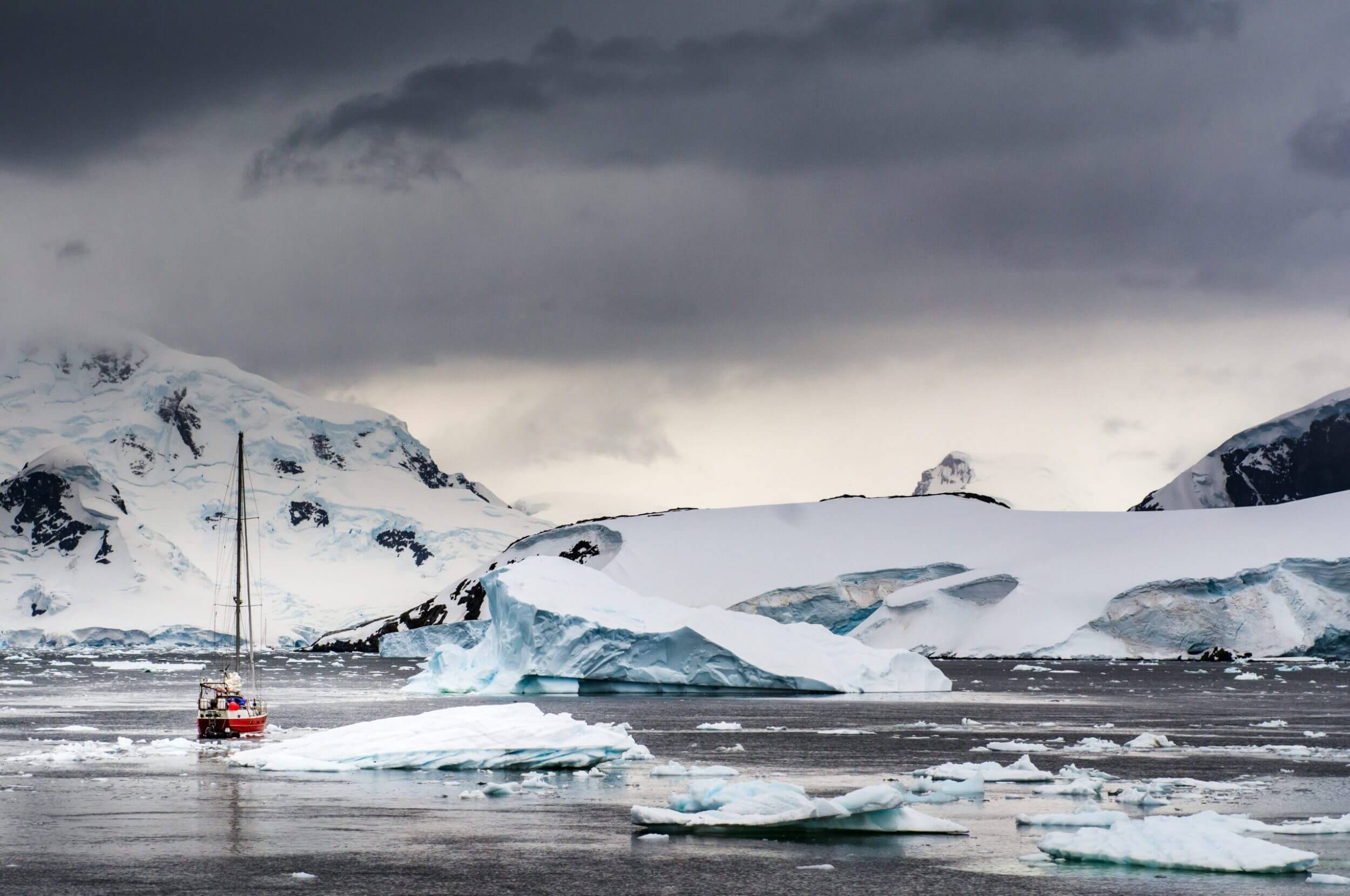
The Sarah W. Vorwerk drifts through the ice near Paradise Bay, Antarctica. PHOTO: SIVANI BABU.
Antarctica had started out as a pipe dream — a childhood “what if” born of hours paging through an atlas so large and dense that I could barely lift it. From my home in California, my fingers would trace a route south through Mexico, and Central and South America. I would explore Bolivia and Brazil and then jump back and forth between Chile and Argentina until I reached the very tip of the inhabited world. I’d stare at the Drake Passage next: the blue band where the oceans converged, the 600-mile boundary between the known and the unknown. And then, I’d cross it.
“Someday, I’ll go there,” I would announce to myself quietly as my fingers reached the solid white landmass on the other side.
And I did. I made my first trip at 26, hoping to satisfy my childhood curiosity. Instead, I found the unlikeliest of homes. Antarctica became a part of me. It became my obsession and all I could think about was getting back. Four years later, just shy of my 31st birthday, I was returning not on a ship with stabilizers and hundreds of other people, but on the Sarah — a sailboat dwarfed by the swells that surrounded her — with eight strangers.
As a child, I had lingered in the blue space between South America and Antarctica and then merely hopped over it. As an adult, it wasn’t that simple. The Drake Passage was not just a bit of ocean to be crossed. It was a punishing sentinel. The roughest sea in the world, it guarded Antarctica with a ferocity conveyed by its latitudes — the “furious 50s,” the “screaming 60s.” But its greatest weapon wasn’t the waves, or the winds, or the vicious tempests that tossed yachts like ours around like toys. The Drake’s greatest weapon was the desolation.
~~
“What are you thinking?!”
A close friend and I sat in the tree shade of a city park as smoke-black squirrels cocked their heads and begged for food around us. The oppressive summer heat soaked through our dark suits as the aromas of cheesesteaks and Chinese food and half a dozen other food trucks competed with one another. His voice was laced with worry about my latest decision. We were both lawyers, but only I felt the constant, aching pull of adventure dragging me away from the law. It was a pull he supported, even admired at times, but he had never understood it — had never felt it.
“I’m thinking I want to go back to Antarctica,” I answered.
“Yeah, but why?”
I looked at him and smirked as the conversation began repeating itself. “Asked and answered, Counselor.”
“Okay, fine, but what do you have against ships and… not dying?”
“I have lots of things against ships, but nothing against the other thing. And I’m not going to die.” I rolled my eyes.
“So, it’s not dangerous.”
I paused, contemplating a response. “Well, it’s not not dangerous,” I said. “I mean, once we get to Antarctica, we should be fine and we’ll probably be fine before then, too.”
He tilted his head in suspicion, mimicking the squirrels in the grass. “What happens before you get to Antarctica?”
“We cross the Drake Passage.” The corners of my mouth rose in a mischievous smile, “It’s a ginormous, swirling rip current of doom.”
“This isn’t helping. You’re not helping.”
“I was kidding about the doom part.” I sighed and picked at the grass, rubbing cool blades between my fingers, “I just — It’s been…” I shook my head. “I need this.”
He paused. “I know.”
~~
From my perch topside, I peered down the ladder that led below deck and watched as one after another, my companions made their way to the single toilet we all shared and then went back to their bunks. From time to time, someone would pop his or her head out for a little fresh air, but the nausea proved to be a skilled assassin of conversation.
I had first heard the retching in the early morning. Initially, it was a vigorous sound full of energy, discomfort, and the night’s meal of potatoes mashed with bok choy and topped with mustard and nutmeg. After the first couple rounds, the sounds became half-hearted and desperate, filled with fatigue and a longing to escape the nausea. I had awoken in the morning and had breakfast. I had sat at the narrow dining table and reread my favorite chapters of Alfred Lansing’s Endurance. My gift in the Drake Passage was that I didn’t get seasick. It was also my curse.
But its greatest weapon wasn’t the waves, or the winds, or the vicious tempests that tossed yachts like ours around like toys. The Drake’s greatest weapon was the desolation.
Without nausea to displace them, the tendrils of loneliness settled in my stomach and snaked into my thoughts. Antarctica was supposed to be an escape from this feeling. A triumphant return to a place where I knew I belonged. A hard reset that would banish the listlessness and disappointment that had permeated my life back home. I had been planning and longing for this adventure for a year and a half. On the worst days, there were two reasons I dragged myself out of bed: A job that I loved, and this trip. I had been certain that Antarctica was what I needed, but in the open ocean that certainty abandoned me and left in its place an unending, swirling mass of doubt as wide and swift as the Drake itself. Had I overestimated the power of a place? Was traveling with strangers really the best way to stop feeling like a stranger in the place I lived? Had I built up Antarctica so much that disappointment was the inevitable consequence? Had I brought the desolation with me?
We crashed down into another trough, surrounded in every direction by towering walls of water, and a single question clawed its way to the forefront of my mind.
What was I thinking?
~~
For hours, I drifted in and out of memories and observations as the sea rose and fell, the percussive tap, tap, tap of saltwater on the back of my jacket, and then on my face when we changed direction. The captain came out to trim the sail. We made small talk for a bit and then he went back below deck. The first mate came up and made her way to the side of the boat before leaning over and emptying the contents of her stomach into the sea.
“There. That’s better,” she said as she looked over at me, wiped her mouth, and lit a cigarette, the wisps of smoke curling and wafting up slowly before catching the thunderous wind and disappearing. We spoke for a few minutes before she, too, descended the ladder. I couldn’t bring myself to follow either of them down.
I rode to the top of another swell and caught sight of a speck in the distance, but it was gone as we came back down. A few moments later we rose up again and the speck revealed itself to be the silhouette of a bird. It disappeared once more and I twisted my body and craned my neck, searching for it in the sky. The shadow passed over as finally it dropped into the trough and floated above us in the roaring wind, fog-white except for its pale orange beak and feet, and the dark gray tips bracketing wings that spanned nearly the width of the boat. As it plunged to eye level, I glimpsed its back, the artful feathers flowing from fog to storm — from white to a gray that matched the tempestuous skies the bird called home. A watercolor in flight. It harnessed the wind, gliding weightlessly, gracefully. Dipping, soaring, circling. I knew what this was.
“You should see them,” I’d told a colleague before leaving land, my voice soft with reverence. “The wandering albatross is like nothing else on the planet.”
“What do they look like?”
“Like flying dinosaurs. They’re huge. They have the longest wingspan of any bird — up to 11 feet, maybe more — and they spend most of their lives circling the globe at the roughest, stormiest latitudes. They’re masters of the wind.” I launched into an explanation of “dynamic soaring” and a study I had recently read about. “It’s the same technique NASA has been looking at to power unmanned aircraft for extended periods of time, and these birds use it to fly thousands of miles in a single journey, to stay at sea for years at a time.”
“Why don’t they go to land more?”
I shrugged. “It’s just easier for them to keep moving than to stop and start again. It takes less energy.”
She studied me for a moment. “So, basically, it’s the bird version of you…”
~~
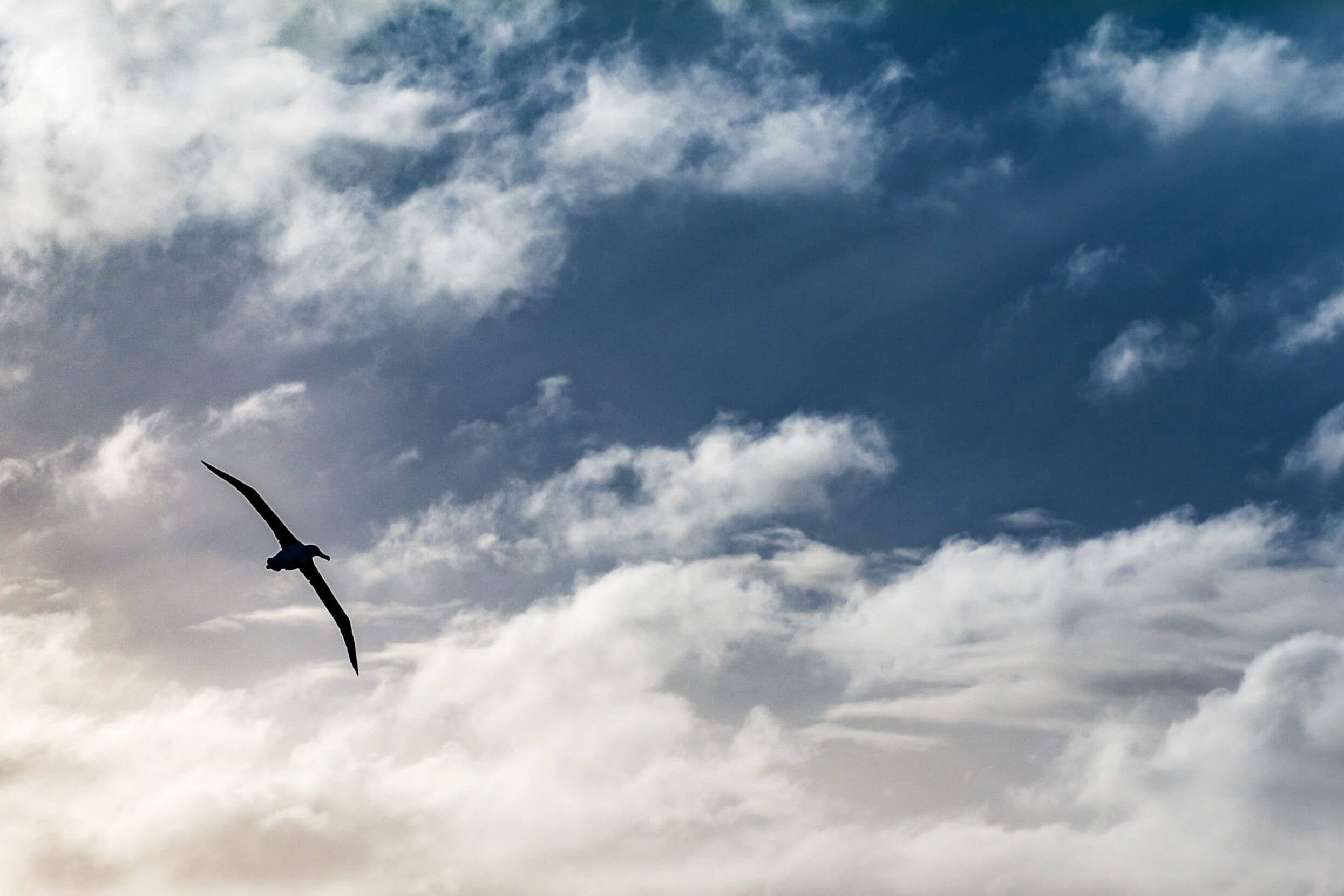
An albatross soars through the sky in the Drake Passage. With the longest wingspan of any bird, the wandering albatross spends most of its time winging across tempestuous seas at it circles the globe. PHOTO: SIVANI BABU.
Early mariners in the southern latitudes had once seen the appearance of the albatross as a good omen. They had respected the bird, had felt a kindred spirit in this mariner of the sky which they believed carried the souls of sailors lost at sea. To kill an albatross was to court catastrophe.
The albatross circled again and excitement battled with the loneliness I had been feeling all day. I watched it soar over our mast and then settle in beside me. I had seen these birds before, had even seen them in these waters, but there was something about being at the mercy of the same winds. Suddenly I understood.
I was never alone.
How many people had seen this very albatross, I wondered? Albatross can live for decades and they spend most of that time at sea. To how many people had this bird brought the same comfort it gave me? I was connected to each of them through this elegant, winged behemoth. I was not sure that this bird carried the souls of sailors, but it certainly carried their hopes. To watch the albatross fly was to feel a kinship with all those who had looked out over these waters and found comfort in the companionship of a bird. To watch the albatross fly was to feel a kinship with the eight strangers below deck on the Sarah.
By morning, the hatch would be closed and it would be too dangerous to stay topside. A few days later, our legs wobbling, and our bodies bruised from four days of being tossed around by the Drake, we would step onto the rocky shore of Livingston Island where curious penguin chicks would examine our boots as they wandered by molting elephant seals bathing in warm sunlight. Antarctica would not disappoint — would never disappoint. It would always be home. And in a month’s time, when we sailed back in to Ushuaia, Argentina, there would be no strangers on the boat, only family.
Out there watching the albatross, I didn’t know any of that, but I could see the potential and that was enough. I wiped the saltwater from my camera and pointed it towards the sky, tracking the albatross as it soared towards the sun.
Sivani Babu
Sivani Babu is the co-founder, co-CEO, and creative director of Hidden Compass. By merging journalism, art, and exploration, she tells stories that offer perspective, context, and an awe-inspiring sense of scale to the human experience.
Never miss a story
Subscribe for new issue alerts.
By submitting this form, you consent to receive updates from Hidden Compass regarding new issues and other ongoing promotions such as workshop opportunities. Please refer to our Privacy Policy for more information.

